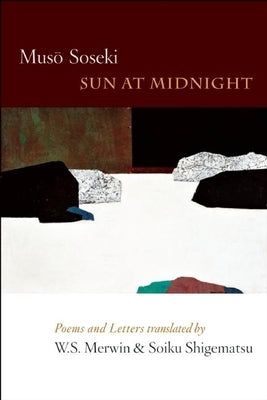Description
An undisputed master.--The New York Times
Long out of print, this reissue is the first translation into English of the work of Muso Soseki, the thirteenth-century Zen roshi and founder of the rock garden. A gorgeous introduction by co-translator W.S. Merwin sets the stage for 130 poems and six letters to the Emperor that combine delicacy and lightness with penetrating plainness. Essential for poets, gardeners, and students of Zen.
Toki-no-Ge (Satori Poem)
Year after year
I dug in the earth
looking for the blue of heaven
only to feel
the pile of dirt
choking me
until once in the dead of night
I tripped on a broken brick
and kicked it into the air
and saw that without a thought
I had smashed the bones
of the empty sky
Born ten years after Dante Alighieric, Muso Soseki was the most famous Zen monk of his time, and is considered the father of the rock garden. Muso spent much of his early life practicing Zen in remote temples and hermitages. In spite of this isolation, his reputation grew, and he served as an advisor and teacher to several emperors, as well as to more than thirteen thousand students.
W.S. Merwin is one of the world's foremost translators of poetry.
Co-translator Soiku Shigematsu is a Zen scholar, poet, and translator who serves as the abbot of Shogen-ji Temple in Shimizu, Japan.
Author: Muso Soseki
Publisher: Copper Canyon Press
Published: 07/16/2013
Pages: 195
Binding Type: Paperback
Weight: 0.60lbs
Size: 7.40h x 5.40w x 0.80d
ISBN13: 9781556594397
ISBN10: 1556594399
BISAC Categories:
- Literary Criticism | Asian | General
- Religion | Theology
- Poetry | Subjects & Themes | Inspirational & Religious
About the Author
Muso Soseki: Born ten years after Dante, in 1275, Muso Soseki was the most famous Zen monk of his time, and is considered the father of the rock garden. Muso began studying Buddhism at the age of six, and he spent much of his early life practicing Zen in remote temples and hermitages. In spite of this isolation, Muso's reputation grew, and he served as an advisor and teacher to several emperors, as well as to more than 13,000 students, over the course of his lifetime. In his old age, Muso again withdrew from court life and devoted himself to the study of Buddha dharma, spending much of his time cultivating the Zen gardens for which he is best known. Muso died in 1351, leaving behind numerous gardens and an enormous body of poetry and prose. In honor of his influence over Japanese politics and culture, Muso was posthumously renamed Muso Kokushi, or national Zen teacher, by the Japanese Emperor Go-Daigo.

